It’s that time of year again – the annual Sports Technology Buyers Guides. My goal here being to give my specific recommendations – exactly the same recommendations I’d give to my own friends and family, based on the continual usage of most of these products in product testing and comparisons – as well as just my day-to-day running, swimming, and hiking. This list isn’t here to compile every option on the market in an effort to make every manufacturer happy. It’s a condensed list of my recommendations.
Now this year I’m doing things a bit differently. Previously I had one giant page with everything in it: Running, cycling, swimming, action cameras/drones, sensors, etc… And this year is basically no different, except that I’ve split it apart into a few different guides:
– GPS Watch Recommendations (Running/Hiking/Triathlon/Swimming)
– Cycling GPS Computers (and sensors)
– Action Cams & Drones
The content is the same, just broken out into three shorter guides instead. The reason for this is frankly pretty simple: People don’t search for “Sports Tech Recommendations”, they search for “Best Running GPS” or such. Further, I found the previous guides just got so unwieldy to make and read. These will all pop out pretty quickly (as in, over the next 24 hours).
Oh, one more thing, if you’re new around here note that I don’t take any money/sponsorships/whatever from any of the companies. That’s just the way I roll. So if I like a device, it’s because it’s a legit good device I want to use. With that, let’s dive into it!
All Arounders:
Recommended Watches: Apple Watch SE, Fitbit Sense, Garmin Venu 2, Samsung Galaxy Watch 4
This category is aimed at folks that don’t necessarily need the crazy battery life or durability of the other categories. Meaning, if you’re aiming to keep your runs to a few hours or so (even a marathon), then all of these watches will do perfectly fine. The amount of sports and smart features varies slightly between them. Even more so when you consider the app ecosystems of each. For this guide though I’m mostly just focused on the features as-is in the box. The reason being that we can’t always depend on 3rd party apps supporting each update of the watch, or even being there in a few months. Still, 3rd party apps can often fill some of the feature gaps – even if the experience is slightly disjointed. That’s what makes app platforms so powerful.
For this category, all of these watches float in the $200-$400 range, depending on whether there’s a sale or not. In the case of the Apple Watch SE, you can substitute the Series 7 if you want the always-on screen. But more about that in a second. These are arranged alphabetically.
Apple Watch SE:
Out of all the Apple Watches I’ve used over the past year, the Apple watch SE is the one I’ve tended to use the most. The follow-up being the Apple Watch Series 7 since launch. Both are great units, and both have the finesse that nobody else in the industry has managed to top. The Apple Watch SE in particular has seen some quiet behind-the-scenes firmware updates over the last year that have pretty substantially improved GPS & optical heart rate performance. I no longer see the issues I saw on launch a year ago. Meanwhile, the Apple Watch Series 7 delivers solid accuracy as well, especially in more recent firmware updates (such as over the past few weeks of usage). The key difference between the two (aside from price) is the always-on display of the Series 7, versus the Apple Watch SE has a display that only turns on when you raise your wrist.
These days with apps like HealthFit, Athlytic, and others, you can easily use an Apple Watch with 3rd party fitness platforms and advanced sports insight and data. While the core Apple Watch workout recording app is embarrassingly basic, there’s literally a thousand apps you can use instead if you want more advanced data field configurations or more features. Those will come with a cost, albeit usually very small, but the world is literally your oyster. Note that with any Apple Watch you’re basically charging it every night – though you can usually get about 1.5 days of battery life, so an every other day flip-flop can work out too. Oh, and finally, remember that the Apple Watch *ONLY* works if you have an iPhone (not even an iPad).
Fitbit Sense:
This one might come as a surprise to some, but the reality is that at Fitbit’s more reasonable pricing as of late, the Fitbit Sense is a pretty good option. And it’s a super well-rounded option, especially if you don’t need super structured training or other more serious features (since it largely lacks those). Instead, it makes up for it with the larger Fitbit ecosystem, including both connectivity to friends as well as more activity-focused data than you can shake a stick at. While I’m not a huge fan of their shift lately to paywall some of your data-access features that should be free (and are on every other platform), the majority of the Fitbit Premium subscription instead provides plenty of other benefits that if used, are worth the cost. Over the past year, Fitbit has made good progress on making some of the data actionable from the Fitbit Sense, compared to when it first launched.
With the Fitbit Sense, I’d mainly be buying this watch if you’ve got friends and family on the Fitbit platform, or if you’ve already got a Fitbit. Unlike the other three entrants in this category, I wouldn’t be buying the Fitbit Sense in hopes of 3rd party apps. With Fitbit declaring that Wear OS will be their future for smartwatches, the Fitbit OS has basically been abandoned by developers (not that it was a hotbed before anyway). Still, that doesn’t take away from all the built-in features, which with the lower price are far more appealing than the launch price more than a year ago (then at $329).
Garmin Venu 2/2S:
As one might suspect from this lineup of four watches, the Garmin unit is the most sports-focused one of the bunch. Yet, with the Venu lineage, it means that the AMOLED screen is closer to that of the fancier displays from Samsung, Fitbit, and Apple. In the Venu’s case, you can choose whether you want the display in always-on (with less battery life), or in a raise-to-wake configuration (closer to a week of battery life). From a daily monitoring standpoint the watch has all the activity tracking essentials like steps/distance/calories, plus more advanced features like SpO2, breathing rate, and VO2Max tracking.
Garmin’s main thing in life is all the sport modes, as well as structured training options (be it for yoga or running a marathon). Everything from race training plans to animated step-by-step gym workouts are included (whereas other companies oft charge for this). Still, as I’ve said in the past, I think this watch makes more sense at the lower price points than the higher ones. So right now it’s on sale for $349, whereas it’s a more challenging buy up against the Apple Watch Series 7 at $399, unless you’re looking for those sport-specific features or longer battery life.
Samsung Galaxy Watch 4/Classic:
The Galaxy Watch 4 is easily the best smartwatch that Samsung has ever made, and also notably, the first one on Wear OS. It’s probably no coincidence those two are tied together. With Wear OS, Samsung now has access to far more apps than before. And not just more apps, but now better maintained apps than on Tizen, where things mostly languished. While I tested both the Watch 4 and Watch 4 Classic, my personal preference was actually the classic edition, which has the rotating bezel. It felt more ‘complete’ versus the smaller bezel-less Watch 4.
Now I’d caution that I’d really only recommend the Galaxy Watch 4 to Samsung users. Not even really Android users. The reason is that many of the newer features are locked to only being available when paired with a Samsung phone. So you won’t get the same experience without it. Further, unlike in the past, Samsung is not permitting the Watch 4 to be paired with an iOS device either. Setting those limitations aside, I found this a good all-arounder watch, though it did struggle slightly more than the other three in this category when it came to GPS & HR accuracy. Some users have reported that these issues have been resolved in more recent firmware updates, but I can’t confirm that.
| Product | Amazon | |
|---|---|---|
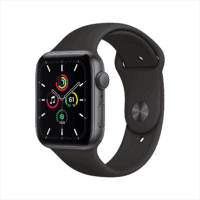 | Apple Watch Series SE | Amazon |
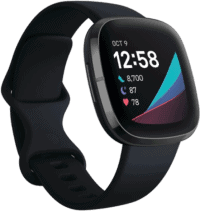 | Fitbit Sense | Amazon |
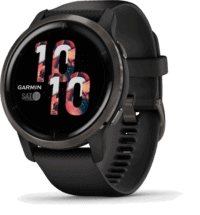 | Garmin Venu 2 | Amazon |
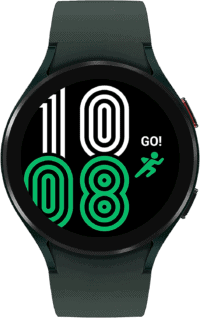 | Samsung Galaxy Watch 4 | Amazon |
A Runner’s Watch:
Recommended Watches: Garmin Forerunner 245, COROS Pace 2
This category is mostly about simplistic in a smaller form factor with the most you can pack in that’s really just focused on the runner. Certainly, any of the higher-end watches could fit here too. But right now both these watches are $200 during the holidays, and normally the Forerunner 245 is only $50 more at $249. The point being that if you’re data-focused or duration-focused, both of these will easily fit the bill from structured training to plenty of data metrics afterwards. Or, you don’t have to be all about the data. If you just want a sleek running watch, both of these do that too with minimal fuss.
COROS Pace 2:
Arguably the single unit on this entire post with the most bang for the buck, the COROS Pace 2 is a full multisport watch that can do swim/bike/run/triathlon, but even more than that – it does running very well. It’s got a built-in track running mode, but also has native running power inside the watch itself – so no need for secondary sensors or the like. This can be used for pacing instead of native running pace. The watch recently got increased structured workout support from TrainingPeaks, as well as numerous watersport modes for stand-up paddleboarding and more. Oh…right, one last thing: It’s only $199. This watch easily competes with far more expensive watches from Garmin, Polar, Suunto, and Wahoo.
While COROS introduced some running training load metrics this past spring, they’re a fair bit more limited in reality – especially if you run on any hills, or if you do any cross-training. So they’re primarily suited at flat-land road running, versus anything else. Still, it’s a good start. And plus, COROS continues to prove they’re adding feature after feature to the Pace 2, such as the GoPro integration just last week.
Garmin Forerunner 245/245 Music:
While this Garmin watch lacks some of the triathlon features the COROS Pace 2 has, it makes up for it with added running features like PacePro and in the case of the 245 Music, well, music. Offline music specifically, including Spotify and Amazon Music. Garmin’s most current mid-range Forerunner encompasses almost all of the higher-end stats found on what were previous highest-end watches. Of course, as always, there are new higher-end stats in the land – which you’ll find on the FR745/945/Fenix 6 (I cover those later).
But for most people, you’ll find you get everything you could possibly need for running or racing with a Forerunner 245 or 245 Music. PacePro being one of the big additions, which allows you to get dynamic pacing information based on grade and splits. You’ll also get the newer safety/tracking assistance features as well as more data fields/page layouts than years prior. Last year it also got Garmin’s new Track Running mode, which snaps your workouts to the track to get flawless GPS tracks and distances.
| Product | Amazon | Competitive Cyclist | |
|---|---|---|---|
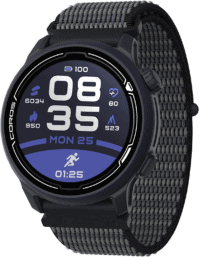 | COROS Pace 2 | Amazon | |
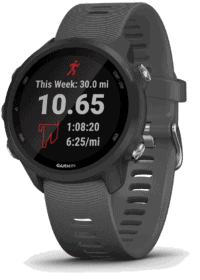 | Garmin Forerunner 245 | Amazon | Competitive Cyclist |
The Triathlete:
Recommended Watches: Garmin Forerunner 945, COROS Pace 2, Polar Vantage M2
This category is for what the industry calls ‘multisport’ watches, but that typically just translates to triathlon watches. They track your time/distance/etc… within the three sports – swim/bike/run. From a non-triathlon multisport aspect, these watches are often used by everyone from windsurfers to skaters, mostly because of their versatility and flexibility in configuration and display customization.
Note that the minimum requirement to be a multisport watch is specifically a multisport mode, which allows you to record multiple sports (e.g. swim/bike/run) in a single activity/file. If you have to stop the workout to change modes (like on a Fitbit), that’s not a multisport watch. That’s just a watch that happens to have multiple sports (at least by commonly accepted industry definitions).
Overall Best in Class: Garmin Forerunner 945
I know, I know, you think the Fenix 6 should be here. But I don’t. Mainly because a heck of a lot of triathletes want something that has a quick-release kit, so they can move it to their handlebars. But if that doesn’t bother you, then go forth – you can absolutely scratch out ‘Forerunner 945’ and replace it with Fenix 6 above. They’ve got virtually identical everything, from software to internal hardware (with Fenix 6 having a handful more features).
Still, as for the FR945 – both myself and y’all seem pretty darn happy with it since it came out two years ago – and nobody’s screaming yet. It’s got more metrics than you’ll frankly ever need – and continues to get more updates (even just last week). But I have found the Training Load Focus/Balance bits useful for remembering when to mix up the intensities a bit. And if I want to do offline music, I can do that too – it can connect to Bluetooth Smart headphones and cache my Spotify playlists. Also, if you can’t make the FR945 fit budget-wise, just grab the FR745 instead – it’s what I primarily use as my main watch, it’s basically (roughly) a FR945 without maps, saving you $100+.
Note (added later): On the FR945 LTE, you can largely use that interchangeably here, especially with it on sale for only $50 more than the regular FR945. Obviously, it contains LTE and related safety bits with that. My only concern is whether this is an off-cycle stepping-stone watch for Garmin to ‘test’ LTE on, that’ll have a limited update lifecycle before being replaced by something else. Still, if the price is virtually identical to the regular FR945, it’s kinda a no-brainer.
Best Budget Option: COROS Pace 2 or Polar Vantage M2
In some ways, it’s really a disservice to assume that because these are budget options that they’re somehow bad. After all, the COROS Pace 2 is an incredibly powerful triathlon watch – easily way more feature-rich than the $379 Wahoo RIVAL. The same goes for the Polar Vantage M2, which packs in tons of features, especially around structured training and training load (slightly better training load than the COROS Pace 2, as it encompasses all sports). However, the Pace 2 isn’t limited to just Bluetooth sensors, and has full ANT+ support too – ideal for those with potentially older ANT+ power meters. Still, both are great options if you’re getting into triathlon and aren’t sure what to get.
| Product | Amazon | Competitive Cyclist | |
|---|---|---|---|
 | COROS Pace 2 | Amazon | |
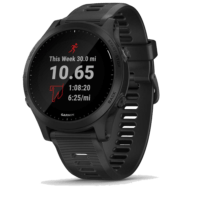 | Garmin Forerunner 945 | Amazon | Competitive Cyclist |
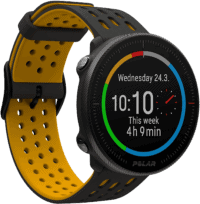 | Polar Vantage M2 | Amazon |
Note: For *triathlon* I do NOT recommend the Garmin Vivoactive/Venu series or Garmin Instinct:
I want to be really clear on this. The reason I don’t recommend these watches is twofold, but mainly centers on the fact that they don’t support a multisport mode. Yes, it supports running, and cycling, and indoor swimming. But you can’t tie all those together in a race or training. Further, while the Garmin Instinct series does support openwater swimming, it doesn’t support multisport mode. Finally, for lack of anywhere else to put it, some will ask about the Wahoo RIVAL. While the company continues to make good strides in the watch, it’s pretty hard to justify its price given its limited feature set, especially in comparison to COROS. As I noted at the beginning, my goal here isn’t to list every watch – it’s to list the ones I’d actually recommend buying to friends and family.
Hiking/Adventure:
Recommended: Garmin Fenix 6 Pro or COROS Vertix 1
This category is all about hiking and adventure, and in 2021 it’s my opinion that needs to have mapping built into it, and it’s gotta have good battery life. I’ve let this category include non-mapping players for a number of years, but I think it’s time to cut that off. As COROS has more recently proved, you can easily put maps on devices that are affordable. Sure, the mapping level differs from device to device. The map set that COROS has is substantially less featured than that of Garmin, but we can dive into those nuances below. As such, that requirement knocks watches like the new Suunto 9 Peak, Garmin Enduro, and Polar Grit X Pro off the list – despite their long adventure-focused battery life. And sure, if you really don’t need maps, then those three units are great options that I’d happily recommend. But in the context of the COROS Vertix 1 and Garmin Fenix 6 Pro both being substantially cheaper right now than those watches (and even at regular prices), it’s hard to recommend them.
Garmin Fenix 6 Pro Series:
There’s still really no competition here. If you’re looking for the most feature-packed higher-end watch, it’s going to be the Garmin Fenix 6 Pro Series. Ok, I guess technically it’s the MARQ Athlete, but I’d prefer to spend that near-$2,000 elsewhere.
For this section I’m specifically recommending the Fenix 6 Pro variant (of any size), since it includes maps (and music, but I’m mostly focused on the maps here). While Garmin has Solar now in all the variants, all my testing has shown that in the Fenix 6 implementations, it’s minimal in usefulness at best (whereas on the Garmin Instinct Solar it’s actually quite meaningful). But ultimately, you’re not buying this watch for its tiny solar panel – you’re buying a Fenix 6 Pro because it does everything you could ever imagine a sports or outdoor watch doing, and generally speaking it does it pretty darn well. It continues to get major new features, including just in the past few weeks, and that added with the pricing down to a mind-blowing $449USD (or 409EUR), it’s hard to ignore.
COROS Vertix:
Ok, right out of the gate – why not the newer COROS Vertix 2? Well, it’s silly overpriced. It was overpriced in August at launch at $699 (even with dual-frequency GNSS which in my continued testing is shrug), and it’s even more overpriced now with the Fenix 6 Pro $250 cheaper. However the COROS Vertix 1? Now that’s more like it. Right now priced at $499 it’s still a bit higher than the Fenix 6 Pro given the current sales, but eventually the sales will go away and things will even out. More importantly though, it just got landscape and topo maps in a firmware update this past Monday, which is kinda insane. I mean, which other watch on the market casually gets flipping full-scale maps 2 years after launch like it’s no big deal?!?
If price were equal, the main reason you’d pick up the Vertix over the Garmin Fenix 6/6S specifically would be longer battery life for endurance events. I mean, yes, the Fenix 6X has great/equal battery life, but the COROS Vertix 1 has that 60 hours as standard. Whereas the Fenix 6S & 6 Pro have 24/36 hours of base GPS battery life. Also, final side note for those eagle-eyed among you: I can’t find my Vertix 1 at the moment, so I used a Vertix 2 in the photo above – though, they look near identical from a distance.
| Product | Amazon | Competitive Cyclist | |
|---|---|---|---|
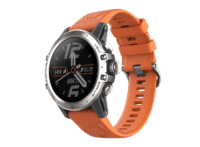 | COROS Vertix | Amazon | |
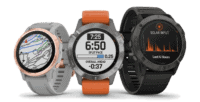 | Garmin Fenix 6 Series | Amazon | Competitive Cyclist |
The Swimmers:
Recommended: Garmin Swim 2, COROS Pace 2, Apple Watch SE/6/7
Ok, stop what you’re doing for a second and go read my massive test from this summer on the best openwater swim watches. Then come back here.
Essentially this category is mostly focused on openwater swimming more so than pool swimming, though realistically they cover both. I’ve just found that while many swim watches get pool swimming fairly right (including virtually every watch on this list), when it comes to openwater swimming, it can quickly reach dumpster fire status. So, this quick section aims to rectify that.
This category remains unchanged from last year, save updating the Apple Watch versions, which I’ve checked again since release.
Best All-Around Swimmer’s Watch: Garmin Swim 2
In a category that actually has no formal competitors, I guess it was bound to win. Like showing up on race day and being the only one in your age group. But in actuality, it really is the best swim watch out there – even taking into account all of the multisport watches that mostly do swimming just fine. The reason it’s the best is rather simple: It’s got more features, and does all of those features better. There’s a pile of new indoor features, especially around automatic rest tracking.
But I think the real star of the show is the openwater swim accuracy. It’s consistently borderline scary how accurate it was. Check out my full review for all those side-by-side track comparisons.
Budget Swim Watch: COROS Pace 2 or Apple Watch Series SE/6/7
If you’re looking for both a pool and openwater swim watch on a budget and don’t care about as much of the fancier smartwatch features, check out the COROS Pace 2. It’s simply a full-featured triathlon watch that also happens to do swimming pretty well.
Similarly, the Apple Watch Series SE/6/7 all spits out fantastically accurate openwater swim tracks, as well as really strong indoor swimming. Sure, it doesn’t have the most full-featured swimming functionality – but if you’re mostly looking to just track laps and splits, it’ll more than do the trick.
Honorable Mention: FORM Swimming Goggles
It’s hard to categorize the FORM Swimming goggles. It’s not a watch obviously, but it does have openwater swim support if you have a Garmin or Apple Watch. But even if you don’t have one of those, if you’re primarily pool-bound, it’s incredibly good at tracking your swim without ever requiring a glance at your wrist or a touch of the display. It just does it all automatically while displaying the stats in real-time on the inside of the goggles, heads-up display like. Sure, it’s a bit pricey at $199 (but is again on sale for Black Friday at $180). Note, do be sure that if you’re specifically getting FORM for openwater use that you pick a Garmin or Apple Watch that’s compatible, as not all Garmin watches are compatible (such as the Garmin Swim 2, because it doesn’t have Connect IQ app support).
| Product | Amazon | |
|---|---|---|
 | Apple Watch Series SE | Amazon |
 | COROS Pace 2 | Amazon |
 | FORM Swim 1 Goggles (with heads-up display) | Amazon |
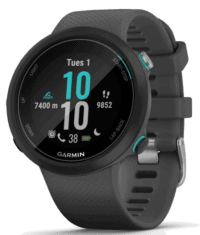 | Garmin Swim 2 | Amazon |
Best External HR Sensors:
If you’re getting any of the units listed above, you may be in the market for accessories. Obviously, some bundles include accessories, while others do not. Here’s what I recommend based on having entire buckets worth of accessories to test with.
No matter which sensor you get, ensure it’s dual ANT+/Bluetooth Smart. It’s virtually impossible to buy something that isn’t that these days, but just want to note that. Ideally, you’d also buy something that’s multi-channel Bluetooth too (like the latest sensors from Polar, Garmin, and Wahoo), just in case you need to connect multiple things to that sensor at once (such as Zwift and a watch).
Heart Rate Sensor (Chest strap): Polar H9/H10 and Garmin HRM-DUAL
Looking for a non-optical HR strap? I almost exclusively use the Garmin HRM-DUAL and the Polar H9/H10 these days, with a side of the Garmin HRM-PRO if I’m doing some running stuff. I generally use the Polar H9 at home for trainer workouts, and the Polar H10 at the DCR Cave (and then by extension, workouts leaving from those locations). There’s no logic to that other than me bringing home the H9 one day and it staying there. The H10 simply has the ability to record the workout itself, if you want. I almost never use that feature since it’s kinda cumbersome.
While the Wahoo TICKR has been on this list for years, and it’s still generally a much-loved strap by many – I (and my wife) have been having some frustrating times with a few of the newer units lately (dropouts namely, both TICKR & TICKR-X). This seems mirrored by friends I know. Therefore, at the moment, it’s in the penalty box.
Finally, it’s worth noting that there are dozens of chest straps out there. And yes, most of them will work just fine. However, I’ve found long-term that buying from one of the well-known brands tends to produce the best results. For example, it’s almost unheard of to hear a complaint about a Polar H9 or H10.
For Garmin users who also run/tri: Garmin HRM-PRO:
If you’re looking for running dynamics with your Garmin device, that’ll require an HRM-TRI, HRM-RUN, HRM-PRO, or RD-POD – or, more recently the Wahoo TICKR X 2020 can do that too. The HRM-PRO is the only one of that group from Garmin that’s dual ANT+/Bluetooth Smart, and despite being pricey, it’s what I’d recommend if you’re a Garmin user that wants Garmin Running Dynamics. While the TICKR X does transmit the Running Dynamics standard, just be aware that it lacks a few fields that the Garmin straps do.
So to that end, if you’re a Garmin runner or triathlete that wants the added metrics while running (or caching of chest HR during a triathlon), then I’d recommend the HRM-PRO. It gets plenty of use too around here, so I’ve got no problems recommending it. It’s basically the newer version of an HRM-TRI and an HRM-DUAL combined together.
Similarly, if you’re planning to be a Wahoo RIVAL user, I’d veer more towards the Wahoo TICKR X than the Garmin straps, since the TICKR X transmits additional Running Dynamics data that the RIVAL doesn’t yet see from the Garmin straps.
Heart Rate Sensor (Optical): Polar Verity Sense
If I’m using a standalone optical HR sensor, it’s almost undoubtedly the Polar Verity Sense, which is basically a slightly updated version of the Polar OH1+. Not only does it broadcast dual ANT+/Bluetooth Smart, but a simple extra button push will record the workout to memory and then sync easily into Polar’s Flow app/platform (and onwards to platforms like Strava, if you want it to).
While in years past I’ve recommended the Scosche Rhythm/Rhythm 24, the app experience just isn’t what Polar’s is. Little things like having only a handful of hours of onboard storage for that is tough – whereas I can record boatloads of workouts to the Polar Verity Sense and it happily syncs them all down the road. Plus, you get the entire Polar training analysis ecosystem along with it.
| Product | Amazon | Competitive Cyclist | |
|---|---|---|---|
 | Garmin HRM-DUAL | Amazon | |
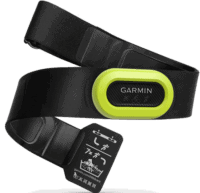 | Garmin HRM-PRO | Amazon | Competitive Cyclist |
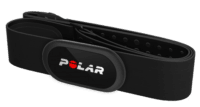 | Polar H10 | Amazon | |
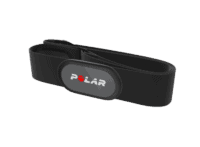 | Polar H9 | Amazon | |
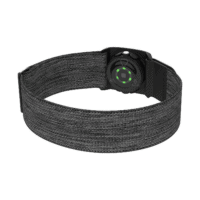 | Polar Verity Sense | Amazon |
Wrap-Up:
Phew, that’s quite the list! One of the good parts about the wearables side here, and in particular this slate of watches, is that most of these watches are unlikely to be replaced in the near term with newer units. For example, both Apple and Samsung have fairly predictable refresh cycles, and thus the next step for them would be next August/September for these units. The COROS Pace 2 is only a year old, and I can’t imagine we’d see a new iteration for at least another year, or at least till next fall.
Meanwhile, watches like the Garmin Forerunner 945 and Fenix 6 Series are undoubtedly due for a refresh. Garmin has historically timed the triathlon Forerunner launches to the spring and fall time periods, but with pandemic-related switches, who knows. Same goes for the Fenix 6, which by most metrics is overdue for a refresh. Again, historically in recent years Garmin has tied Fenix series refreshes to the summer timeframe, while in the earlier days they were tied to the CES/January timeframe.
I think the bigger picture thing to remember is that in the case of both of those watches, they easily stand on their own today competition-wise in their categories. Meaning, there’s no player in the industry right now that’s going to magically release a true Fenix 6 Pro competitor anytime in the next few years (with the same full depth of music, contactless payments, navigation, physiological stuff, etc…). COROS and, in a different way, Polar, are undoubtedly closest in that pursuit from a sports standpoint, but as they themselves will admit, areas like offline streaming and contactless payments will be impossible to implement given their unit volumes. Those technologies require many millions of units per year to even get a seat at the table to have those discussions with payment processors and streaming companies.
Still, that doesn’t mean they aren’t great watches in the areas they focus on. As I’ve noted in this post, COROS has made incredible strides in this area. And they’ve benefited from all that work in the form of both attention and sales. Similarly, as I look towards 2022, what Fitbit could do on a proper Wear OS watch is super appealing. That’ll free them from the limitations of the less-adopted Fitbit OS platform (app-wise), and open up their watches to some incredibly cool apps, especially if Fitbit/Google can crack the battery life nugget. Fitbit’s thing in life, since the beginning, has been smartwatch battery times in the 5-7 day range. If they can manage that with a Wear OS unit – that’d be a game changer.
In any case, it’s easy to think and overanalyze about what might come over the course of 2022, but all of the watches outlined above are here today, shipping today, and usable today. And most importantly, they’re all really good, and all can make you faster and healthier…today.
With that – thanks for reading!

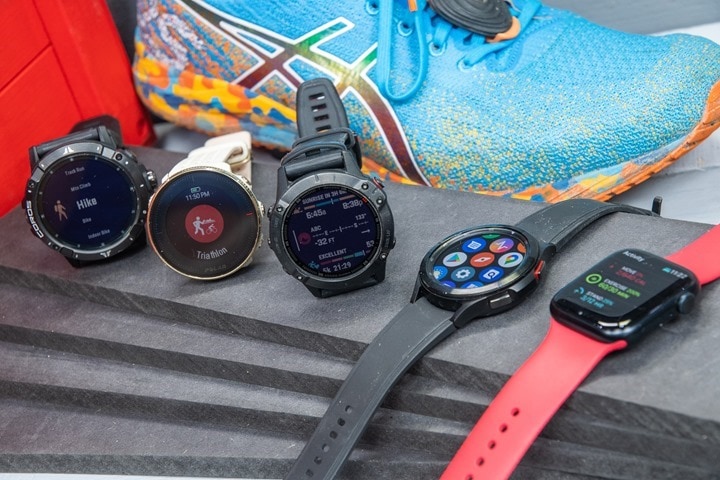
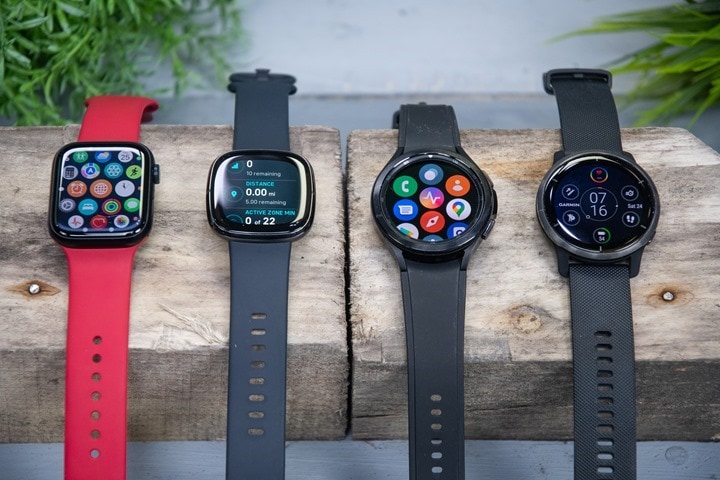
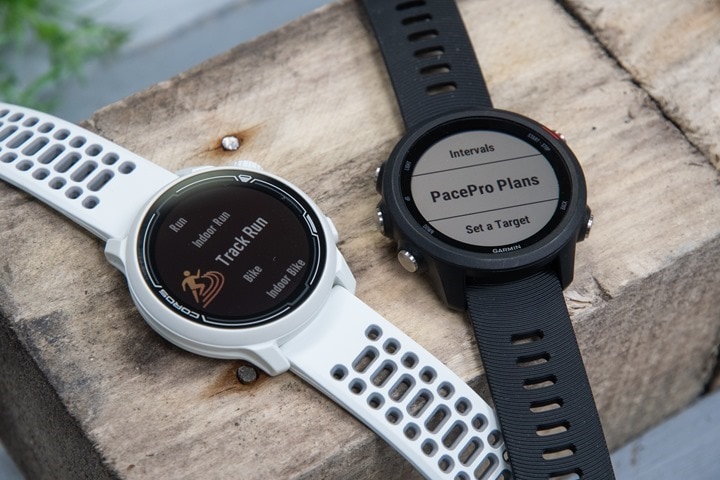
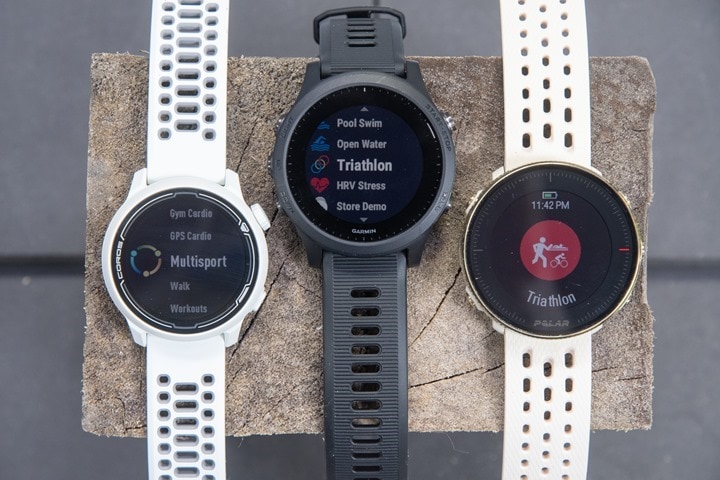
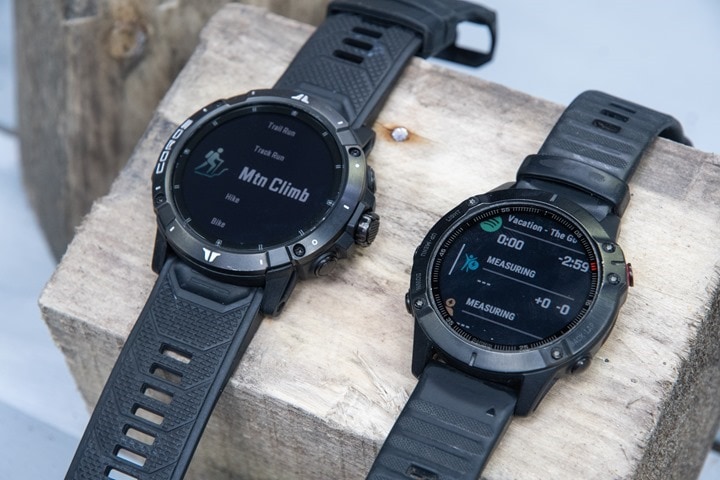
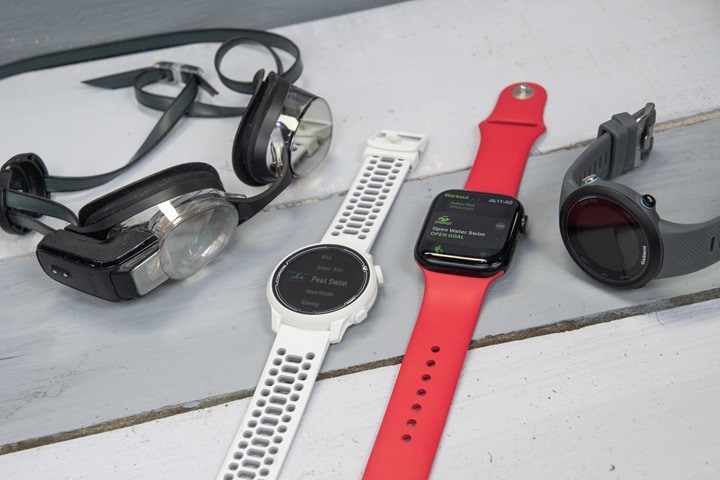
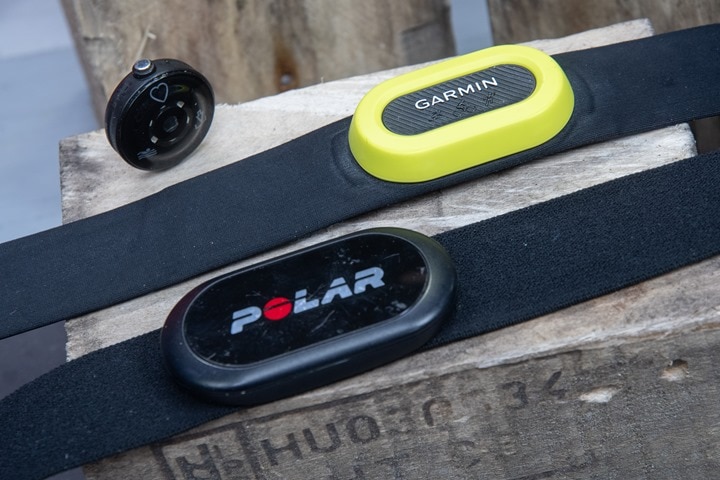
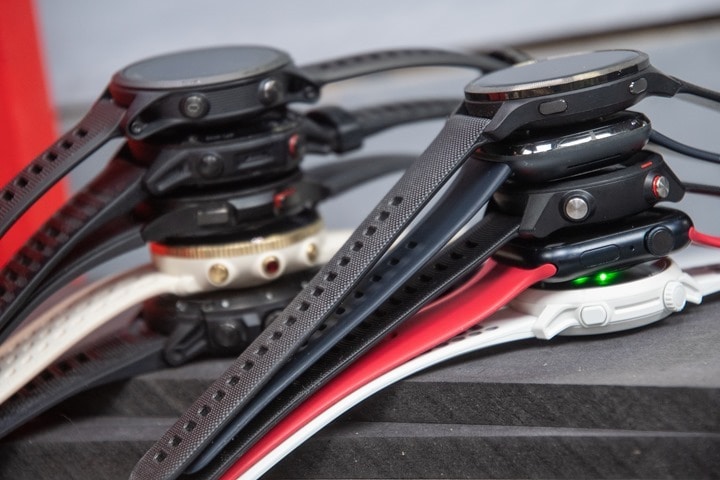

















Surprised the instinct solar doesn’t make this list. At least as an all rounder for the outdoorsman. The battery lasts weeks at a wild price. Just wanted to throw that in as an option to a great roundup
Yeah, it’s definitely a good little unit for sure. I felt like it didn’t entirely fit in the hiking/adventure section, since I explicitly outlined the requirement for mapping. Maybe it goes into the All Arounders, or maybe it’s an addendum to the hiking. I’m not sure.
As noted, it’s got incredible features for the price, especially with the sales. There’s really nothing else like it on the market.
I would class the Instinct as an ‘Adventure’ watch.
Hi Ray,
Long time dedicated reader, first time poster. Didn’t see any mention of the 945 LTE. In your tri recommendation are you essentially interchanging the two? Very curious here as I am still debating on the necessity of the safety features vs. The track record of framing orphan projects.
It’s essentially interchangeable, assuming one considers the additive cost (which isn’t much right now with the sales).
I’m still a bit concerned about whether this becomes an odd-duck model though. I’m really keen to see what happens over the course of the spring. Certainly, it’s getting great updates right now, but we’re only like 5 months into it, and half that for some European countries that more recently got it.
If we ignore the future, then it’s a solid and great unit that I used for the majority of the summer without issue.
The 945lte hate is real… I think it’s great and essentially a fenix 6 with lte.
I don’t think there’s any hate, as I said, I enjoyed it and happily used one all summer. At the right price, it’s somewhat of a no-brainer. So right now for example, on sale and ‘only’ $50 more than the base unit, it makes total sense to me.
That said, I wouldn’t be surprised to see Uncle Amazon get drunk over the weekend and decide to burn some 945 (base) inventory for crazy prices. It has a strong history of doing that on BF weekend. So at that point, it’s tougher.
I guess the challenge is I really want to see them prove this isn’t a middle-child watch that’s but a fart in the wind in between a next-gen unit, merely as a test platform for LTE. Again, at sale prices, it’s no biggie, but at retail it’s tougher.
I think the Enduro and the 945 LTE are essentially field tests for features that will become tentpole featured in the f7 generation platform.
100 percent.
Thanks, Ray. Have been looking forward to this. What are your thoughts on the FR 55 vs the 245 at the same price point. This would be primarily for use during runs, so not sure the screen is a big concern.
At the same price point, I’d go 245 every time.
Have you looked at the Withing ScanWatch at all? I know that it’s not a tri-athelete watch but it seems to be a nice basic smartwatch with SpO2, HR, ECG, and basic activity tracking with an ~30 day battery life. Since it doesn’t have GPS, not sure what category it would go in though.
Trivial miss – left the HRM-DUAL out of the product links underneath it’s section.
Doh, thanks!
Another thing – you were lukewarm on the DUAL in the original review. To recommend it now, has the landscape changed or your experience been better than expected? I don’t see the 4iii device you seemed to prefer mentioned here but maybe the ANT to BT translation isn’t as useful nowadays?
I think the core thing is that it basically sells for a wash between the TICKR these days, whereas in the past it sold at an unrealistic premium. So, given the HRM-DUAL doesn’t fail on me, and the TICKR does occasionally, it’s simple. :)
As for the 4iiii, I just don’t see many people using the ANT to BT side of things as much anymore, in terms of being a major feature. The 4iiii strap definitely does a ton of really cool things, many of them useful, but most of them fairly niche.
I might be making the switch to a Garmin chest HR monitor. I currently have the older TICKRX, but it has recently been going through spurts of getting stuck on random high readings for minutes at a time. My Fenix 5x watch seems to also always read high.
I second Ray’s recommendation of the Polar H9/10 or the Garmin HRM-Dual. He doesn’t mention the #1 feature which is interchangeable straps:
– the sensor turns off when you unplug which is not the case for the integrated Garmin all-in-one design (a strap in my bag has set my post workout HR over 200!). The battery life improvement is significant.
– the H9/10 battery replacement is much easier and safer than a Garmin. There are no tiny screws or gasket to deal with.
– the Polar Pro strap is amazing. It has huge sensor pads and is the most comfortable of any I have tried. The Garmin HRM-Dual, old snap-on HRM-Run and old snap-on HRM-III sensors are all compatible with the Polar Pro strap.
– I have seen many all-in-one (like HRM-Tri) Garmin straps fail in less than a year
– the Garmin running dynamics while making cool graphs are not actionable for any training purpose. L-R balance **might** be useful for monitoring recovery from an injury — maybe.
I have an H9 but replaced the original strap. IMO don’t do that — just get the H10. The Polar Pro strap is so much better it is more than worth the premium over the H9. And get a second Polar Pro strap to keep in rotation. Give your strap a bit of a rinse and scrub in the shower with you and use the other strap for your next workout.
If you already have one of the modular Garmin sensors, keep that and treat yourself with a Polar Pro strap.
You will not be sorry.
If you were previously happy with the tickr you might try replacing the battery and strap. I had a tickr that was exhibiting the same problems and I replaced both, after that it seems to have gone back to its normal reliable self.
Straps can he had for about $15 on Amazon, so it’s not an expensive test if you want to go that route. The straps themselves don’t last nearly as long as the pods and should be replaced every few years, or more frequently if you have corrosive sweat.
The pods themselves don’t have any moving parts and should last a good while, barring manufacturing defects or damage due to a bad O ring seal etc.
That being said I am disappointed that the new tickr generations have had stability issues. When my pod finally goes I’ll probably look at the polar h9/h10.
The Polar Verity Sense is the single best HR sensor I’ve owned. It’s just excellent.
I think your point of Garmin’s being due for update is driven home by 945 and Fenix 6 text being nearly identical to last year’s post. Though actually the whole Triathlon section is almost unchanged.
Did think the 945 LTE would be worth a mention.
I’m dying to figure out what the 945 or Fenix 6 replacements will add to make them worth waiting for given current sales.
Thanks for the review – I was having a conversation about watches the other day, and I’ve forwarded them this review, because it obviously does a much better job than I did.
Should we take the substantial discounts on the Fenix 6 to be suggestive of a relatively soon to release Fenix 7, or would that have come for the holiday season if it were to have been ready in the next few months?
Thanks, excellent job. I very much like the separation in applications and their specific requirements.
What about Garmin Forerunner 55 for runner?
It is new model with some cool features.
I’ve had the 245 and I now have the 55. For running, the 55 has been far superior for me. It’s lighter, holds a charge longer, and has just about all of the 245 features. The 55’s display isn’t as good, but It’s absolutely fine and functional. I had quality issues with the 235 and 245. The 55 has been rock solid.
I’m actually surprised that you’re recommendating Fitbit Sense as they have the most inaccurate HR sensor we’ve seen in years.
On the other side I’m quite happy with my Venu 2 and I’m glad that my personal choice landed on your list :)
No, the Charge 5 takes that cake and prize.
The Fitbit Sense did get some improvements that helped a bit last fall/winter, to the point where if people aren’t overly focused on high intensity intervals, it’s largely fine.
Charge 5 is a whole different story. It can’t get good HR and GPS signal at the same time as I’ve seen in your review. But I’m talking about HR accuracy only. Charge 5 seems WAY more better in that matter compared to Sense, of course when Charge 5 is being weared tight and you don’t care about GPS.
An interesting choice to exclude all products without maps from the hiking category. I wonder how many hikers and mountaineers really find them that essential.
I noted three products that didn’t have maps, if folks didn’t want them.
But the feedback after the Garmin Enduro review was astoundingly clear: If people are paying $700 for a watch in 2021, they expect maps.
I use FR 945 for hiking (among other activities) and find the maps and navigation very useful.
Hey Ray, it’s be great if you started to add running food pods to this for with maybe a focus on indoor track/treadmill running. I’m imagining Stryd would win, but would nice to know for the rough winter months coming up. Thanks!
Are there actually any nother other options besides Stryd these days?
The Zwift Pod (aka MIileStone Pod) was one, which I was going to say was discontinued, but it looks like they have it in stock again (finally)! I had generally good luck with it.
Beyond that there’s the BLE only Polar one, but that’s like as big as the shoe itself. It’s crazy.
I think with so many watches having track mode these days, that’s primarily what I use outside. But yeah, for indoors it’s either that or the NPE Runn (my general preference).
There’s another way to look at that – if you want runpower, what’s the recommended watch, Most people use Garmin IQ watches or Applewatch with stryd app, but then there are watches with on-board runpower and power based structured workouts
You pointed out in your “connect iq conference speech”, runpower does not seen to break through, but the ecosystems for running based training plans have evolved a lot the last year and maybe the topic deserves a mention (or even a category) in your recco.
So I just got the fenix 6S pro coming from AW3. Loved everything until I used it for MTB with preloaded gpx file using course navigation – something I often use. Why the heck there are no directional arrows on the course?! MTB trails are often crossing each other and are directional.. with fenix I can’t see the direction. Now before you say use navigation – I turned that feature off after 10 minutes – it kept alerting like crazy- even in switchbacks which was really annoying. The heading bug becomes useless when it gets away from you.
All I need is to glance on map and see which direction I need to go when I am approaching intersection. Is there any way to get arrows on the course? I couldn’t find it..
Yeah, I agree it could be useful. Interestingly, they recently added directional arrows to the Edge series…
Thanks Ray. Yeah, that’s what I need but on watch. It blows my mind that fenix doesn’t have it.
Not sure if I should keep it and hope garmin will add that or return it and wait for something else. If Apple will allow Workoutdoors to be always on the display without having to use the glance move I would love it but it doesn’t at the moment..
Trick for getting rid of all those turn warnings on your 6S. Download the course to your computer using “Download to PC” instead of “Send to Device”. Then copy it in to the Garmin\NewFiles folder on the watch. Presto, no more switchback notifications. You won’t get any turn notifications, but you will still get notifications for any custom Course Points you added. Yea, a bit of a PITA, but not as much a pain as continuous useless notifications.
They’ve also added the directional arrows to the 945lte. I have to agree with a couple others here that the 945lte really does belong on this list, even if you just ignore LTE. It’s got all the functionality of the 945 and then some, in a nicer smaller package.
One thing missing is there is zero bike mount options for it, even if you replace the strap with a quickfit strap.
Thanks for the advise. I think easier way is just to turn off the alarms for turns on the watch.
Btw. I tried the navigation feature again today and confirmed that it’s totally useless on MTB trails. Warnings were going off like crazy and were pointless, on intersections where you actually need them – nothing..and to top it off, 1/3 into the ride the watch just crapped itself – went to Home Screen and lost whatever was recorded.. working on return – clearly it’s not for MTB with maps..
DCR: I’m curious why the Vantage V2 and/or Grit X Pro didn’t make this list? IMO the tracking, training load, recovery and structured workout pieces are best in class. I know Polar products generally lack the kitchen sink list of features Garmin throws at everything, is that why?
The Vantage V2 is $499, the Garmin Fenix 6 base it competes with is $349 through the end of the year, which has equal or better training load/recovery tracking (one could argue the nuances of which platform’s training load is preferred, but we can call it equal for the purposes of this conversation).
So, if we set that as a wash, then we look at the rest of the Fenix 6 base features and integrations with 3rd party companies and it’s no longer a competition.
When it comes to the Grit X Pro, it faces all the same problems, but even worse since you can pickup the Fenix 6 Pro with maps for cheaper right now.
But let’s set aside all that for a second, and pretend the Fenix 6 doesn’t exist, so now we’d slate it up against the FR745, which has all the same recovery/training load features, but again, also all the added 3rd party bits and added Garmin features (including music and contactless payments).
This is why I (and every other reviewer) really struggle with the pricing of those two products, they simply aren’t even remotely competitive anymore. Whereas the Vantage M2 is very competitive, even with normal pricing.
Hi Ray,
Vantage V2 is at 350 eur on amazon.de right now; wanting to replace a 5 years old Garmin 230 was always debating between fenix 6 and 745; how is V2 with latest firmware updates stands compared to F6 / 745?
Indeed, the V2 EU deal is pretty good (it’s technically not a Polar deal per se, but Amazon DE just doing Amazon DE).
In any event, it honestly falls into the same camp as the previous message above. Taking into account the sales, using EUR pricing, you’re looking at 350EUR for the V2, or the Fenix 6 Base at 342EUR (and the Fenix 6 Pro at 409EUR). The FR745 is 387EUR.
I don’t think, even with the latest firmware updates the V2 really competes with any of those Garmin watches at the same price point. Essentially everything that was added new to the V2, Garmin already has (slightly different names for it, but they’re all standard issue features). The singular thing Garmin doesn’t have is native running power, which Polar has (without requiring accessories), nor does Garmin have Energy source breakouts (though, inversely, they have post-nutrition tracking, FWIW).
Given you’re coming from a Garmin, I’d presume that means you already have a Garmin account full of data. So continuity makes sense. Versus if you were on a Polar device already with years of data, and didn’t care about the other Garmin features, then staying Polar makes sense.
Cheers!
I just received yesterday my Polar grit X pro and i have the forerunner 745 . I love both platforms and both have much to offer. No complaints about the forerunner 745 , for me it’s the best watch for runners but Polar have some values too. Garmin is an expert selling people features they probably never gonna use . They have now ,since they buy firstbeat great analysis tools ,but before that the data from Garmin apart of the accuracy of gps and fancy software things the data was a crap and Polar was way ahead with reliable data from the fitness point,and still have. Seems to me people focus only on the features and forget the essential and polar don’t give you fancy features or great design and software,but deliver some of the best data on the market. Sometimes reviewers are a bit unfair on the analysis they made, that’s why in my opinion Garmin make their points,fancy features for the costumers and features they will pay a lot of money and never use 😂😂 cheers from Portugal Ray
Hi Ray! In the hiking catagory, I think you could add some more Garmins, like Tactix delta, Quatix 6, D2 delta-series, MK2 and the rest of the Marq-series as well.
Yeah, they’re all the same hiking-wise (exact same features). But yeah, I might add a note just for folks that might not understand that Garmin quirk. Cheers!
Well, I guess they are quite similar when it comes to sports as well.
Cheers!
I’m surprised the Suunto 7 didn’t make it to the list. I was seriously thinking about getting one specially with the black Friday discounts… I will review my decision.
I went back and forth on that one, and in fact, had written up a section.
My deciding factor though was primarily the lack of Wear OS support going forward for the watch, and in particular, combined with the lack of feature updates for it since April. If Suunto had dropped something more recently, or made clear their plans going forward, I’d be more inclined.
The other slight limiter was frankly I wasn’t really sure where to stick it. Initially my thought was hiking (since it does have maps), but then I remembered how quickly it burns batteries in that configuration (like a blowtorch), so it’s kinda more a day-hikers unit, assuming the day is before or after lunch, but not both.
It is possible of course to get better battery if you turn off all the features, but I feel like at that point, well…there’s no point in having a watch with all the features. ;)
But yes, it was close.
Thank you for the detailed reply!! It really helped! Though I love the Suunto hardware, their lack of software support is a deal-breaker… moving to the fênix 6 pro.
I just got the Suunto 7 and not impressed. I’ve been using a Spartan Ultra for the past few years, and went looking for an upgrade, but the 7 ain’t it! APP sucks. May be sending it back to check out the Suunto 9. If that fails the test, I’ll bite the bullet and get the new Fenix.
I bought mine in February, after about a month I put it back in its box and went back using my Ambit3 Sport. Lately I gave it another try, but it is quite weak as a sport watch. I can get maximum 6 hours of battery life out of it with GPS during exercise. I cannot set my maximum HR or HR zones, it just uses a formula to calculate it (220-age, 100%-87%, etc).
The touchscreen is very annoying and the buttons can be pressed very easily with your jacket or upper part of your gloves, etc, so it has to be locked every time when using it.
I hate that I cannot turn off the map. Even when all I do is run around on a track.
No issues with GPS or HR tracking. Very comfortable, but not very small. The AMOLED screen looks amazing in dark, low light, cloudy day, but hard to see in sunlight. Great sound and vibration feedback. Quality build with metal, glass and good plastics, silicone straps.
There won’t be much software updates coming for it, probably just bugfixes now and then as the hardware is not supported by the newer OS. Last update 1st of July, so quite abandoned already.
Maybe the next iteration will be better. If they make it smaller like the 9 Peak and increase the battery life it will be way better.
So many decisions to make with all these sales! For DC or anyone else what would you choose for a watch in this scenario (I’m more a crossfitter then anything else as well)
Vertix for $400 (with trade in)
Forerunner 745 $400 (sale price)
Fenix 6 (regular – no maps) $350
Polar Vantage M2 – $240 (20% sale)
I don’t really need the maps but for the occasional hike they would be nice however I have an Apple Watch 6 that can work in a pinch for that with work outdoors. I’m just looking for something a little more training focused during my workouts, especially when it comes to training load and scoring my training intensity. I’ve been using a Vantage V (first gen) but I’m ready for an upgrade. Just having the music controls on the M2 would be really convenient. Any suggestions would be greatly appreciated.
Oh I guess the $245 for $50 off could be in the mix too. As I said so many decisions being I don’t have a specific use case just more looking for the training load tracking features and a few in workout perks (like the Garmin and Coros strength workout builders) and/or the Garmin HIIT timers that are now on the 745, 945 and Fenix 6.
If the Garmin ecosystem is appealing to you then maybe start w/ Ray’s FR745 reviews with special attention on the training load watch face. If you don’t need training load immediately glanceable on the watch face then the F6 would be slightly more stylish and the FR245 would be less expensive at the cost of features.
Sorry for the delay!
Yeah, as GLT mentioned, the reason I choose my FR745 is somewhat silly: The training load watch face and the color. Size is also a slight factor.
Fwiw, all the Garmin’s have music controls. So that’s a wash no matter what.
I’d think if you’re coming from Vantage V and wanted a change, the 745 or base Fenix would be substantial. The M2, while sorta a lateral upgrade would be an upgrade indeed, albeit pretty minor. I’d have to think long/hard about whether I’d spend money to go from V1 to M2.
I kicked it around a bit and went with the base Fenix. With the deals floating around on them right now it was too hard not too ($300 before tax). Thank you for the help and for all the insight your reviews give.
When i was doing some running i had 3 watches available. A 920XT, suunto and the original vivoactive.
I defaulted in the end to the vivoactive. It did everything i needed in terms of recorded my run and showing me my distance and pace. But it had something the other 2 could not match. Ultra light and small form factor. 10 hours of gps time and super light. I would still prefer it even compared to the vivoactive 3 i have now because it was lighter and i think the square design is more useful.
The best jack of all trades Coros Apex didnt get included anywhere?
Nothing missing for a tri watch plus follow track for a hiker that does not need maps.
Given COROS announced last week that the APEX is kinda at the end of its the line for future updates, it’s somewhat hard to include in here. Perhaps as a budget option though, sorta a competitor to the Instinct.
With a lack of updates, will that cause the watch to be less accurate over time? There are so many good deals on older models like the Apex and Pace 2. Both for under $200.
Thank you for the honest info!
Ups someone forgot the whole Suunto range.., But does not matter, always had the impression that we are looking at paid advertisement for Garmin…
Given it took 4 days, hundreds of thousands of views, and 52 other responses before someone said something about the lack of Suunto across the range of recommended products, is probably a good indication that I got it right.
At the end of the day, companies can’t live in a vacumn. Suunto can’t put out a watch that isn’t competitive and expect to get recommended. As much as I like the style of the Suunto 9 Peak, that doesn’t make up for lack of features compared to any of their competitors, being overpriced compared to their competitors, or not being as accurate compared to their competitors.
As noted above in the comments, I came close to recommending the Suunto 7 in a vary narrow set of circumstances, and in fact, would probably recommend it for this weekend’s new $219USD pricing on Amazon (which isn’t standard pricing, just Amazon being Amazon). Still within very specific confines.
Finally, as usual (and as you know), I don’t take any money/anything from any companies I review. So if a company does something well, they get rewarded for that. If they miss the boat in a product, that shows here. That applies to everyone equally, and always has. There’s been plenty (most, if not all?) years Suunto has made the cut. But the last year or two the competition has increased substantially.
Suunto fan here. I asked Ray regarding Suunto 7. Honestly and very sadly I think they are legging behind…. I’ve just bought a Fenix 6x to give it a try… don’t think this has anything to do with paid advertisement….
Not much happened in a years time.
Yes, garmin came with lte and some updated sensors but nothing that will change the (amateur) athletes live much.
Coros could do some catch up with their steady flow of firmware updates with new features (for almost all models!).
To be honest, I don’t expect much from 2022. Garmin might bring out top end sportwatches with fancy screens and some people who are more focussed on smartwatches than sportwatches might like that. And there could be some more sensors which datacollectors will love.
That means for me, except for the battery no much sense in updating my ancient forerunner 935
FYI the insta360 one x2 is on sale at adorama and b&h link to adorama.com
Woah, Suunto completely knocked out of the running on all fronts (legitimately, to be sure). Any concept if they’re even planning to including mapping on future watches? I’ve been a longtime Suunto wearer for hiking and outdoor use, but as you noted in that section, it’s hard to get a pricey new watch for that and not care about maps these days.
Thanks for the years of useful advice and reviews! (longtime reader, first time posting)
Any recommendations for cross country skiing? I’m having trouble finding anybody talking about this.
I do a mix of cycling and x-country skiing (in the winter). This would be my first watch in a long time. Currently looking at the Coros Pace 2, Apple Watch SE (not sure how the battery handles cold), and a garmin 245?
I found your youtube channel and website last week. Thanks for the great content!
I can only comment on the Garmin watches. Any Garmin watch can record a cross country ski activity, and you can configure the data pages like any other activity to your own liking (pace, speed, distance, heart rate, elevation, etc). I look at heart rate, pace, and distance after I am done. If you are concerned about elevation or anything fancier you probably would want to look at a Fenix or 945. I even have a separate activity for roller skiing.
The only difference between the various watches is the type of icon that shows up. A FR 55 you will need to leave the activity called other and see a generic person icon. On a FR 245, you can name the activity whatever you want and you will see the generic other icon when selecting it. On a FR 645 you can name the activity and see a little skier icon. On a Garmin Enduoro, you can name the activity and will get a different icon for skate, classic, and backcountry. I like seeing all the different little icons in my activity list on the Enduro, but it is not really a purchasing decision (just makes me smile).
Nice list, thanks for the post! Not criticizing in the slightest (It could be hell of a difficult thing to narrow down the list), but looking around, I find that the Venu Sq is actually pretty popular. I was also surprised, how much the FR45 can do compared to the previous generation, but I don’t see that so often. But… the most important missing item: Aren’t you still wearing the red FR745 with its amazing watchface? :-D
I am indeed.
Though, I’m honestly not sure how exactly to recommend it. I included it above, as a budget alternative to the FR945. Which, last week, was indeed a budget alternative as it was $399, now it’s risen slightly (though not quite back to $499). So normally, the FR945 sits at like $520ish, and the FR745 at $499, so it’s messy.
Plus, I’m not really sure how many people from a recommendation side care about “Is watch red with a silly watch face that Ray likes?, Then let me introduce you to the FR745!” :)
Garmin should buy that phrase :-D But yes, if the difference is only $20, the 945 with maps is a trivial choice. Anyhow, it wasn’t a serious complaint on my side, I just was curious ;-)
I do wish 945 had more colors though.
And I’m quite surprised Venu 2 Sq is not available. Square display is more practical and many people find it prettier too. I’m not sure why Garmin skipped it but my girlfriend hopes they’ll fix that mistake rather sooner than later. Fingers crossed :)
One aspect that seems to be overlooked is when old watches die. Rechargeable batteries only recharge a certain number of times and after a while they loose there ability to retain much charge and shortening their active time.
I had a sports watch for about 3 years, but it definitely not retaining it’s charge. The company (who I will not name) said that they would replace the battery – £150! They actually sent me a new watch. Is it just a prompt to buy a new watch?
It would be nice to see tests done in this. Also, I hope, that right to self repair, etc. will help in this, and make this more environment friendly. I can see that happening, as the watches got updated a lot in the last decade. So now nobody would want to buy a FR25, as even the cheap options have so much more features. I doubt that we will have such major updates in the next 10 years, so there will be a demand to repair an old watch. We will see :-) Just a fun fact: I have a FR201, with which I tracked a 5+ hour long trail run last year without any problems. I was pleasantly surprised with that :-)
In general, most watches are rated for usually between 800-1,000 charges before things start to dissapate. Which, when you start doing the math is pretty insane.
For most people, your watch will die of some other cause well before battery is the main cause of death. That said, certainly battery drain and swap can be an issue. It’s what will eventually cause my wife to swap her original Feinx 5 (which will be 5 years old this March).
The challenge with fully waterproofed watches and battery replacements is that it’s not really practical to have them be end-user replaceable in this day and age with how small the components are and how much is packed to the gills in there (versus older watches that you took to a watch repair place to swap batteries and test).
Sorry, but are U crazy to ignore the really best of the best Sportswatch on Planet? POLAR Grit X PRO :)
I love my Grit X Pro. The fitness and sport features are generally as good. The flow app is better.
Okay Ski routes would be nice, but unnecessary. I would like topo maps but probably not use them much. If I’m hiking, I’m bringing a bigger screen. I don’t care about paying with my wrist.
One reason not to buy an Apple Watch or a Garmin is the Grit looks way better and then you won’t be wearing what everyone else is.
H10 review link points to the H7 review from 2012.
However, I don’t find an in-depth H10 review, so maybe it didn’t change significantly beyond extra connection types?
No, despite me using it probably more than any other HR strap (or perhaps even device), I still need to write-up a review. It’s release mostly pre-dated me writing up HR strap reviews.
But it’s on my to-do list.
I am stoked as hell to be getting a Fenix 6 Pro Sapphire today thanks to the DCR seal of approval (and Black Friday buying guide)! Nabbed one for $499 last night and couldn’t be happier. Hope to get a good 4+ years out of this beautiful piece of hardware (that I haven’t even got my hands on yet, lol). Thankfully returning my Gen2 Oura ring and opting out of their Gen3 upgrade after a horrendous experience with their customer service. Feels good to go with a trusted brand.
No separate category for trail running? In my opinion it is different enough from either running or hiking that the top recommendations in either category wouldn’t be good trail running watches.
Coros Pace 2 doesn’t have navigation features. FR 245 doesn’t have barometric altimeter. Fenix 6 Pro would be the best ever trail running watch according to its advertised feature set, but in reality it is quite mediocre running watch and even worse trail running watch due to its distance/pace accuracy when running on wooded trails. The same kind of applies to Coros Vertix 1 – from what I’ve heard it isn’t a great running watch.
Sadly I can’t name a single existing device that I’d like to upgrade to as a trail running watch. But I am curious to hear your recommendation.
Why wouldn’t the hiking/adventure watches work? Either the 945 or Fenix 6 series are likely the best navigating watches, so if those aren’t accurate enough for you not sure which would be. He also mentions COROS Vertix getting maps added. Do some of the watches support courses if not full navigation? Then you could load a route to follow.
Fenix 6 isn’t the best navigating watch. It has the maps – that is true. But it has tons of issues with navigation especially if you consider faster paced activities like trail running or MTB. I could probably write a whole page of text about how navigation is broken on Fenix series. If we ignore the maps, the best navigation implementation is on Suunto watches. And as I said, trail running is not all about the navigation. A great trail running watch must also be a great running watch – meaning that pace should be accurate and distance should be reasonably accurate when running on trails. That completely disqualifies Fenix 6X which is probably the worst *running* watch that I’ve ever had (with the emphasis on the “running” word).
945 would be a better trail running watch than Fenix 6 – that I would agree with, but it still shares some of the issues with Fenix 6.
Strange – I use a 6x for navigation on trails and have zero issues. Pace, maps or otherwise.
Yeah, I’ll be honest, I don’t think in the nearly 2.5 years the Fenix 6 has been out that I’ve seen many comments saying they couldn’t use the Fenix 6 for trail running. I’ve had no issues with it, trail running across numerous continents with it and navigation. And I know a number of mountain bikers that use it, but realistically, using a watch as a navigation device on a bike in the first just isn’t many (or my) people’s cups of tea.
Thanks for all of your in-depth reviews! Apologies if I missed it, but have you ever reviewed Amazbit watches? Specifically any of the Amazbit Bip watches? I am considering one (vs a used Garmin) for my 13-year old child who runs cross country and track (and has an iphone and will have her own Strava account when she has her own watch). Thank you!
Not in a couple years. I usually pick them up, poke at them, and then get a bit bored/distracted (with very few people asking for reviews on them, unfortunately).
So you would say the fitbit sense has better gps and heart rate accuracy than the galaxy watch 4? I thought the heart rate and gps tracking was the worse of the bunch?
I have been looking to upgrade from my 935. I also use a 520 plus for cycling. One thing I have found is my 7 day training load does not appear to combine my data in connect. It appears I have a training status or is it load from each device. I read below that u get a training load per device. Is this still correct. Sort of means that if I want one unified health story I need a 1. A separate app and 2. No real benefit in having only Garmin devices. Here is someone else’s view from a few years ago. link to reddit.com
Maybe I am using training load wrong on my 520.
The reason I noticed an issue was that I boosted my activities over the last few months with my 520 but the training load seemed to ignore it. Even though all data went to connect.
First time post -I enjoyed reading this blog. Where would you categorize the tactix Delta? I understand that this watch includes military features for the soldiers but where does it stand in comparison to the battery life and GPS capabilities with being a multi-sport watch.
Hey all, I am predominantly a cyclist who is starting to dabble in a bit of running, and looking to replace a dead Garmin Edge with a watch. What would you be recommending for this kind of application?
Hello dear Community,
I had a lung embolism two years ago and have been diagnosed with thromboses after that.
I am looking for a watch that tells me when I can work out again (I am bad at guessing that) and if I work out too intense.
And also check my blood oxygen levels 24/7 if possible.
I am eyeing the Garmin Venue 2S, sine it offers me enough data that I can adjust my lifestyle to a more healthier one, fitting my current energy levels.
Or would a whoop4 be a better alternative?
Salutations
Serdar
Hi. I currently have a735xt mostly running trails but also club runner xc and road league. I haven’t own treadmill and use Zwift so I also have a Stryd. I occasionally cycle too.
Considering upgrading to the 6x pro second hand as limited budget of ideal max £250
Upgrading mainly for bigger screen, maps and route selection/heat map and few extra features like pace pro, maybe crash detection music etc – I assume 6x pro best option? Thanks
There’s no doubt that newer watches have many new and useful features. But if we take just basic features, like the accuracy of HR and GPS, has there been a significant progress from the times of, lets say Garmin 920xt? I still see even several tri pros using this for example.
I need a new watch as my forerunner 35 unfortunately was stolen. I’ve found some different garmins (and want to stay with the brand) at t the same price point refurbished that don’t really fit in the same class so its hard to make sense of cross class comparisons… forerunner 45, venu sq, and vivoactive 3. My only real complaint with my 35 was it took awhile to lock on gps to start a run and occasionally had trouble in downtown highrise areas or really wooded areas. I Only use the watch for running and don’t really care about sleep tracking or anything extra like that. which of those three would you say is the best fit? Thanks in advance!
I have to comment on the Garmin HRM-Dual. The data connection was solid, no dropouts or crazy readings, but the strap and sensor housing designs are terrible.
First the strap. This is so over-engineered with the triple layer middle adjustable section. It is very confusing and difficult to get the 3 middle sections all the same length. Also, the right side connector is uncomfortable as it digs into the skin, even with the little connector flap covering. And finally, all of Garmin straps seem to lose their elasticity faster than others I’ve used over the years (4iii and Wahoo).
Now for the HRM housing. I was using a new HRM-Duo for about 10 months when it lost signal. I assumed a dead battery, so after the ride, as I went to replace the battery, I realized that back cover is attached by 4 extremely tiny Philips head screws. On mine, 2 of the screws had pulled through the plastic back cover, so a gap had opened up and moisture had penetrated the seal into the sensor’s innards. I took photos and notified Garmin, and to their credit, the replaced it. Now, a year later, the same thing has happened. The 4 tiny screw design is very poor and unnecessary. No reason they can’t have the standard “coin slot” design used by everyone else. The design requires special small screw drivers, is very hard to handle for a person with large hands, and is difficult to see without magnification.
So, I’m done with Garmin HR devices, looking to their competitors going forward.
You forget to compare simple features that are not available in Polar flow world (but present in Garmin connect)
For instance :
1) Editing back the ending point of a training session is not available. If you forget to stop your session, thus it keeps recording while heading back home in you car, then you can’t edit…
So stupid and something that should be a Must !
2) importing a .tcx file (fitness file format including heart monitoring as well as gpx info).
Polar lets you export tcx files, but does not let a user import them. Polar lets users manually import a training session (basic final information entered in a form), but it does not count in later weekly/monthly reports.
As an example, if I forget to start my gritx when hometraining (under Zwift). So I can’t import detailed tcx data (from Strava/Zwift) to Polar flow. And again, I have to double record because Polar flow would not synch with Zwift or Strava what’s recorded with Zwift.
I have other stupid stuff in mind, but those two speak for themselves
Hi Ray! Would u still recommend the 6x pro on hiking/running or is it worth looking at fenix 7x for example? (Almpst double price when 6 is on offer)
An update would be nice to this list?
Dear Buyer / Buyer mandate
We OOO GSK-NEFT are an official Oil & Gas Trading Company / Mandate
working direct with Russian Petroleum Refineries which deals on
Russian Petroleum Product such as JP54, D2, D6, JA-1 ETC with good and
workable procedure whereby buyers need to have there owned TSA of
their logistic company that is to sign CI along with the buyer and
insert tank numbers as proof that buyer has tanks availability at the
port to avoid waste of time and delays. Kindly Contact us via
E-mail: {ooogsk.neft@mail.ru} for our official
SCO.
Best regards
Mr Burdin Dmitry Yuryevich
Tel: +79268063267
Email: ooogsk.neft@mail.ru
Skype: ooogsk.neft@mail.ru
Ray- What watch do you like most for tri? Garmin Fenix 7 or new Garmin 955?
I currently own the Garmin Fenix 5 and am considering new update. Thank you! Best, Tim
Same here! The enix 2 is also perhaps worth considering for its maps display when used on the hiking trail in addition to running.
Just out of curiosity, do you foresee the new 955 or fenix 7 replacing your recommendation for the “best” triathlon watch? I’m in the market for a new one since my suunto trainer gave up the ghost recently. I’m trying to decide if it makes sense to go for one of these, or if I would be potentially better served by a more budget minded option (also from coros or polar).
I’m also generally curious about which ecosystem you think is the most future proof. If I am anyway going to make the effort to swap to a new world I’d like to try and pick the one that is going to give me the best bang for the buck.
DC, you should update the tri recommendations to be 955 instead of 945LTE, and hrm-pro plus instead of “hrm-pro”
Yeah, I usually plan to update this in the fall. The challenge with picking one to replace (e.g. the FR945LTE to the FR955, which I totally agree with), is that then I see the FR245, which would go FR255. And then I see Fenix 6, which depending on the price, goes Fenix 7. And on and on.
It’s like a house of cards. :-/
Just put the 920XT back on the list and be done with it ;)
I’m just an old man, who loves gadgets
Thanks for this post! I’m torn between the fenix 6 solar and the forerunner 945 as they are both the same price at the moment. I want to use them for cycling, running, rowing and hiking. Which would you suggest I choose? Thanks
Thank you for sharing this amazing idea, really appreciates your post.
Like the article – thanks! Hoping a new updated version of the recommendation is coming soon, especially considering the new Epix (gen 2) and Enduro 2 being released recently…
What’s the best choice for a (mainly) runner’s watch, but one that could also track laps in smaller pools?
TIA!
Any chance of you doing an updated buyer’s guide soon? A lot has changed in the last year and I need to replace my dead fenix 5s.
Long time reader and love your website. A gentle request to update this page, or at least note the 955 is out versus the 945. I went to send this page to someone and noticed the absence.
And can I please request a head to head review page of the 945 vs the 955? I need to justify a further upgrade to my wife :)
Doesn’t the 955 review cover the differences and maybe have comments in the wrap up about upgrading?
no more update? 2023 now
2022 Smartwatch overview.
link to dcrainmaker.com
Not quite same, however for recommendations you can likely substitute in the newest Forerunner 255 and 955 for triathlon, Fenix 7/Epix (depending on screen preference) as overall or rugged choice, Enduro as the special long life champ. Not sure for lower end or lower prices options; I’m not familiar with the other brand offerings
Thanks for your reviews. I’m looking for my first Smart Watch. I have a couple of remarks.
They are BIG. Old reviews would say this. By watch fitting guides, the smallest ones, 44mm, are considered for big wrists. I considered my Festina Chrono Bike as big and bulky. Nothing is as small as this watch. I suppose the upside is the screen being big is readable.
I get it, they have to get that (mostly poor) battery life. I’m surprised that the apples and Samsung’s on this world can’t make watches that last more than a day (except the pro 5, but see the first comment)
When is the technology going to level out? Why is their so much hate for anything that’s a couple of years old. I’m feeling that right now whatever I buy will be outdated next year.
Maybe the best option is to buy one of the better watches from a year or two ago that they’re dumping for cheap. Then upgrading in a couple of generations. In bike land the head units have pretty much leveled out. No one is rushes out to the get latest one unless they crashed and broke theirs.
It also feels like ever one has a weakness, from battery to how well they interact as a phone. I’m betting that in a gen or two, there’s not going to be a significant difference between a fitness watch and a smart watch. There probably isn’t now, you only need a few vital while training or racing. Everything else is downloaded to a coach/ecoach.
Obviously, my sport is cycling, I rode at the top amateur level. I have a nice garmin head unit, power meter, etc that collected all the data one needs. I had a PC based program but mostly relied on a coach to analyze my data and help me meet my goals. A lot of people now are using online coaching (trainer road) that reads the data in and tells the athlete what to do, or not. Much better than coach garmin’s advice which is a good laugh.
I am happy to buy through an affiliate link but can someone recommend a big box retailer that is a good place to check out as many tangible fitness watches as possible. Thanks.
@SF — Unfortunately I have *not* found a retailer whom would carry most/all of the Garmin watches to see and handle in person. That being said, I have found that REI (mainly) and Best Buy (limited models) carries most of the major/popular Garmin sport watches, eg Fenix, Epix, Venu, Forerunner, etc.
Went to five or six retailers this weekend. REI had the best selection. I was able to try on about 8 different watches but they were not charged and thus all I could gather was fit not functionality. At none off the stores were any of the watches charged or functional. At the Apple Store, on the other hand (NPI), there was a full suite of the three latest models and the ability to check out substantial functionality and all non-customized styles and band combinations.
Hello everyone,
I’m looking for a smartwatch that suits my needs.
I had an Amazfit T-Rex Pro that worked flawlessly until it suddenly died with no reason.
It’s time to buy something more reliable.
What I’m looking for is a RUGGED smartwatch (I feel naked without a watch, I wear it 24/7 during all activities from sport to sleep), my main sport activity are mountain biking and gravel riding. I don’t care about phone notifications, I do care about sport, sleep and fitness tracking, long or acceptable battery life, heart monitoring, maps, and an OS ecosystem that is not closed as Amazfit’s.
I have no clue on what I have to look for, so I’m asking for some tips and/or recommendations.
Thanks!
I appreciate your in-depth reviews.
Is there a category that is “basic sports watch” that prioritizes long battery life?
I have a Garmin 220 – It has all of the stats I need for running.
However, I would like a watch that also allows me to track swimming (pool/outdoor) and prioritizes battery life (I love the idea of the battery life offered in the Instinct 2).
– It should also be operated by buttons – I get sweaty and don’t want the hassle.
So – basically, the 220 that I can swim with and has a long battery life.
Are you familiar with the heart rate issues in certain activities with the Epix 2? Cycling last year showed no signs of any issues with the wrist based heart rate monitor. Fast forward to this spring and when I cycle my heart rate doesn’t get above 100 bpm while I’m hitting 170 bpm with a chest strap. I sense some software update to fix something else may have caused the situation I’m having. Garmin have said they are aware but I’m not getting much feedback. Indoor spinning doesn’t have an issue for me.
I loved my Coros Pace 2 but the bezel has just stopped working 4 months after two year warranty expired. Customer service refuse to replace so feels like a total waste of money. My Garmin forerunner 305 lasted about 15 years. Really disappointed Coros only lasted 28 months. They’ve lost a life long customer. Would not recommend them.
Will there be an article-update sometime? Soon it will be 2 years since November 2021.
Cheers and thanks for the good work.
Hi- do you plan on issuing an update to this guide any time soon? It’s a couple years old at this point. Thanks.
Optical HRMs – the Polar Verity is selling on Amazon at ~$95 versus the Scosche Rhythm R+2.0 at ~$30. That’s a HUGE difference and really shifted my mind. Hard to justify the triple price for slightly better software (I don’t care because I’m just gonna link it to Garmin, Strava, etc etc etc) and onboard storage that I wouldn’t use….
Will this be updated anytime soon?
This list is way out of date but its linked all over the right side of your main page so it should be updated. There are comments saying this is out of date but no response or update.
I love your site (long time reader since it was just The Girl) and want to give a link to someone who wants to buy a Garmin watch, but at least put a different link instead of a 2021 page. This seems very unlike you because you’re always up to date and on top of things–are you ok?
I am struggling to find.a watch or unit that stays connected to my Apple Watch and gives an accurate Calorie burned count. I have tried many external HR Monitors, Polar H10,Garmin, Polar Sense, Scoche, Wahoo etc. Staying connected and accurate HR readings are not consistent. The Garmins give accurate HR but not even close on Calories burned. Calories burned are how I Judge my Workout effort.
Hiya, Ray, I’ve noticed this recommendations guide is from 2021. Any chance you will be making an updated version of it any time soon? All the best, Michael
Hi Ray, I’m late to the party clearly but found this super interesting. I would love to see a 2023/2024 update to this list! Do you have anything in the works?
This section needs an update :)
I’ve been looking for an affordable or moderately priced watch to track my mountain biking rides and strength training sessions at the gym. Currently, I’m using the Fitbit Charge 5 with Trailforks, but after reading numerous online reviews, it seems that watch technology struggles the most with accurately tracking these specific activities. I’m okay with a bit of inaccuracy as long as it’s consistent, so I can establish a baseline performance and improve from there. Do you have any recommendations?
First off, I want to thank you for the incredible depth of research, reviews, and teaching you provide on sports tech. Your content has been invaluable!
I wanted to ask if you’ve come across any plans or updates from Garmin to incorporate mountain bike-specific metrics (such as Grit, Flow, and jump stats) on their multi-sport watches. While Garmin’s Edge series offers these metrics, it seems their multi-sport watches like the Fenix or Forerunner don’t offer the same level of mountain bike integration. Many mountain bikers may prefer to use a watch instead of a computer, especially for “crash” protection vs an out front computer.
Is this something Garmin might consider, or have you heard of any alternatives to track MTB-specific data through a watch?
Thanks again for all you do!
will there be a 2025 watch update coming soon?
Why does your website feature this when it’s over 3 years out of date?